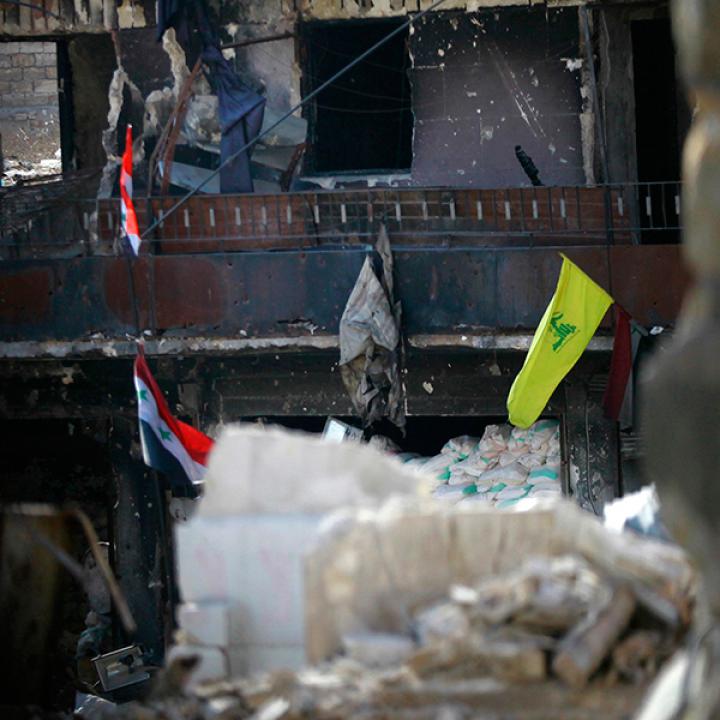
- Policy Analysis
- Articles & Op-Eds
Will Trump Strengthen Iran's Hand?

The Trump administration cannot say it is going to be tougher on Iran and at the same time partner with Russia in Syria -- the two goals are mutually exclusive under the current circumstances.
President-elect Donald Trump's priorities in foreign policy have yet to be spelled out in any detail. Certainly trade matters to him, and so does going after ISIS; the events in Ankara and Berlin are sure to deepen that impulse. In that connection, he has said more than once that the Russians and the Syrians are fighting the Islamic State, and that we should take advantage of their doing so. This is a far dicier proposition than it may appear on its face -- particularly inasmuch as it may strengthen the hand of Iran throughout the Middle East.
With both Russia and Syria being responsible for a siege, starve and scorched-earth policy in Aleppo, and Bashar Assad's regime likely to regain control of the whole city, the war in Syria will soon enter a new phase. As campaign pledges begin to give way to on-the-ground policy, it is extraordinarily important for the new administration to understand what will help us defeat ISIS and who we need as partners in this fight.
Until now, the priority of the Russians and the Syrians has not been ISIS but rather the rest of the Syrian opposition. Their key partner has been Iran and the Shia militias it is employing in Syria. Indeed, with Assad having as little as 20,000 deployable forces, he has had to rely heavily on the Iranians using Hezbollah and other Shia militias from as far away as Afghanistan to meet the regime's manpower needs for actually taking and holding territory.
One stunning indication of the centrality of the Iranian role in the fight: Qassem Suleimani, the head of the Quds Force of the Iranian Revolutionary Guard, was pictured in recent days surveying the front in Aleppo. Suleimani, once a shadowy figure, is out there publicly to show that Iran is and will be shaping the future of Syria -- and in a way that serves Iran's regional aims.
For Iran on the one hand and the Turks, Saudis, Qataris and Emirates on the other, the war in Syria is also about the larger balance of power in the region. Joining with the Russians and the Assad regime in Syria will be seen as abetting Iran's aspirations for regional dominance by many of our traditional partners.
Rather than helping in the fight against ISIS, this may cost us the Sunni Arab partners we need. They are the ones who must provide the manpower to defeat ISIS on the ground. They are the ones who must help with reconstruction and governance in the aftermath of the defeat of ISIS -- and to ensure there is no vacuum that can later be filled by the worst forces. And they are the only ones who can discredit ISIS, which claims among other things to be the protectors of the Sunnis.
Wherever the Shia militias have played a prominent part in the fighting, we have seen deeper sectarianism. Reports now of executions of civilians or noncombatants in neighborhoods taken in Aleppo sound eerily similar to what the militias have done in Iraqi cities like Ramadi and Fallujah. And it is that very sectarianism and the resulting Sunni perception of exclusion and oppression that produced the alienation that fueled ISIS' emergence in the first place.
Certainly, President Trump will not want to see ISIS defeated and then see its next incarnation during his time in office. He also has made it clear that he does not want to engage in nation-building or long slogs in endless Middle East conflicts.
But that again should lead his administration to be leery of joining with the Russians in Syria unless the Russian policy is going to change. At a minimum, Vladimir Putin must stop abetting Iranian power. The Trump administration cannot say it is going to be tougher on Iran and at the same time join with the Russians in Syria. The two are mutually exclusive.
That said, the new administration ironically may find that Putin is more open to being responsive on Syria. At this point, Putin has achieved his primary objectives there: The Assad regime now or will soon control all the major population centers down the western spine of the country; the Russians have access to an air base and naval facility and have an air defense capability that now covers the eastern Mediterranean; they have demonstrated that nothing can be decided in Syria without them.
For Putin, a political settlement now makes sense. Staying involved in an ongoing insurgency does not. But for that, he needs the opposition -- which is fractured -- to accept a political outcome, and there is little prospect of that so long as Assad remains in power.
There is certainly no chance of it if Turkey, Saudi Arabia and Qatar will not use their influence and resources on the opposition. Their relations with the Obama administration were not good. There may be an opportunity for the new administration with them, but President Trump must show he knows who threatens the region and who does not.
As a dealmaker, the President-elect understands that without leverage, little is possible. If he wants to move Putin on Syria and Iran, he must demonstrate he has it.
Dennis Ross is the counselor and William Davidson Distinguished Fellow at The Washington Institute.
New York Daily News



